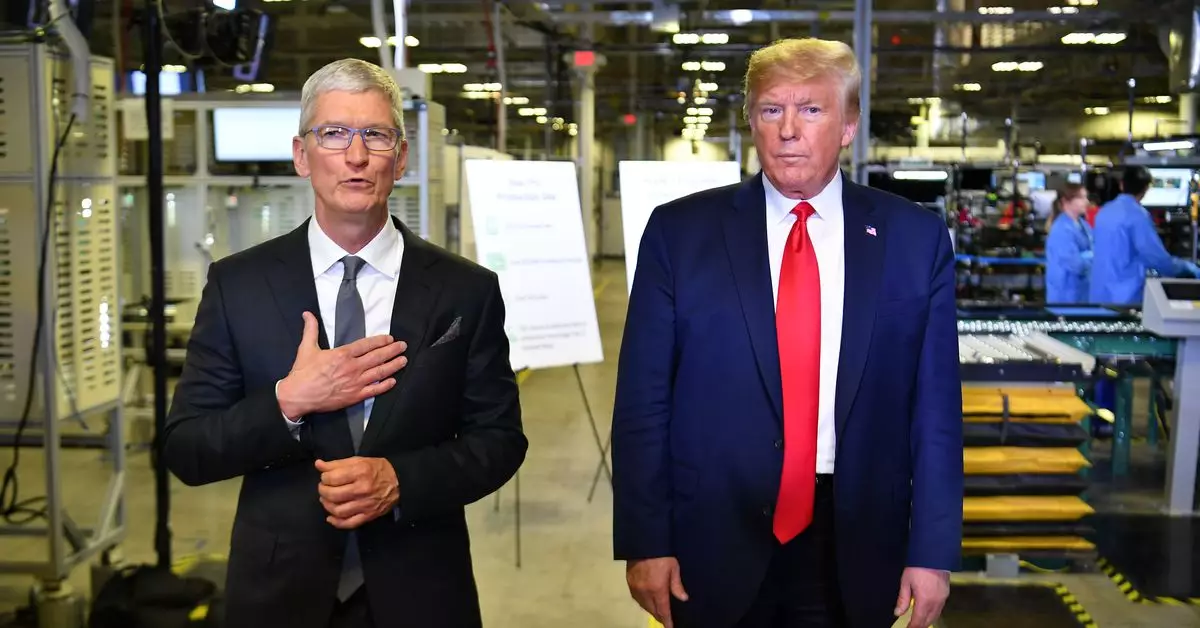In an era where corporate leaders often navigate complex political landscapes to ensure their companies thrive, few examples stand out as prominently as Apple CEO Tim Cook’s relationship with former President Donald Trump. Reports illustrate that Cook managed to establish a personal rapport with Trump that eluded many other tech executives. This connection proved beneficial not only for Apple but also for Trump, as their interactions often aligned with the broader agendas of both the tech giant and the administration.
Cook’s strategy involved fostering a relationship that wasn’t mired in typical corporate lobbying. Rather than relying on a team of lobbyists or government relations professionals, Cook sought to connect with Trump directly. Utilizing phone calls and face-to-face dinners, he aimed for a more personalized approach—something that seemed to resonate well with the former president. Such informal interactions allowed Cook to present Apple’s positions without the usual bureaucracy that can complicate corporate-political relationships.
Targeting Key Issues
One of the strategic moves Cook employed was the simplicity of his messaging. In meetings with Trump, he focused on delivering a single, impactful data point rather than overwhelming discussions with a myriad of topics. This approach ensured that the discussions were concise and directed, minimizing the risk of diverging into irrelevant territories. By zeroing in on specific areas of mutual interest, Cook was able to keep Apple’s agenda relevant in the eyes of the administration.
For instance, Cook successfully influenced Trump’s tax policies in 2017 and effectively navigated the turbulent waters created by tariffs in 2019. His ability to align Apple’s goals with Trump’s agenda—whether through economic growth or job creation—demonstrated an astute understanding of how personal relationships can translate into legislative benefits. By shifting the narrative to how Apple’s success was part of America’s broader economic strategy, Cook presented himself as a collaborator rather than merely a corporation seeking favors.
Imitating a Successful Model
The Wall Street Journal’s insights into Cook’s approach reveal a blueprint that other tech leaders seem eager to emulate. Executives from companies such as Boeing and FedEx are reportedly looking to replicate Cook’s connectivity strategy by reaching out directly to Trump. In a political climate where personalized connections can sway decisions, this tactic may become increasingly valuable. However, the question remains: Can other leaders successfully forge such relationships, or is Cook’s influence an exception rather than the rule?
Companies are also exploring alternative means of communication, including channels aligned with Trump’s interests, as evidenced by Elon Musk’s previous backing of Trump’s candidacy. The implications of these strategies highlight a growing trend among CEOs who are willing to engage in flattery and direct outreach to ensure their companies remain in the good graces of powerful political figures.
Tim Cook’s interaction with Donald Trump serves as a compelling case study on the potential for personal relationships to shape corporate outcomes within political frameworks. This dynamic illustrates the evolving landscape in which tech executives operate amid political powers. As this trend continues, the balance between business interest and political influence will require a delicate touch, making Cook’s method of diplomacy a significant example for leaders aiming to navigate a shifting environment. Whether this new model will flourish or face challenges remains to be seen, but the lessons from Cook’s approach offer valuable insights for the future of corporate leadership in politics.

